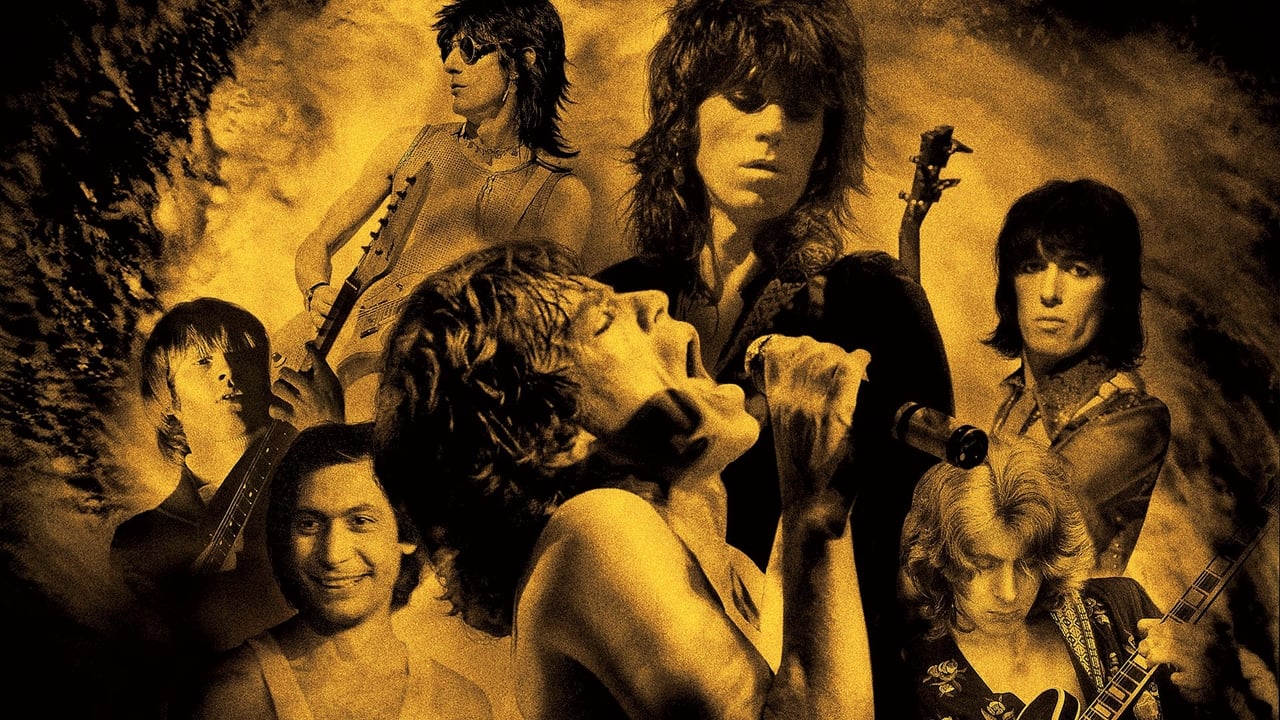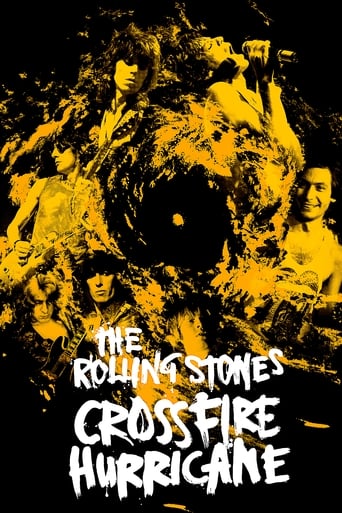

ridiculous rating
... View Moredisgusting, overrated, pointless
... View MoreGreat movie. Not sure what people expected but I found it highly entertaining.
... View MoreStory: It's very simple but honestly that is fine.
... View MoreI really enjoyed watching this documentary and seeing the footage complied in an excellent manner. My only complaint is that the viewer is left somewhat in the lurch as to the time frames and years of performances and interviews. The first part of the film bounces around the early days of the band from the mid 60's. It would have been good to see some sub-titles on years and concert locations included with the footage. The last part of the film is mired between Ronnie Wood joining the group and Keith's drug problems in Canada. The only way to ascertain the time line is the footage of the newspaper clippings that contain the dates. Hardcore Stone's fans who have followed the group since the early 70's would know the time line, but other casual fans would have difficulty in determining the dates of the events. The end of the movie seems to jump a gap of about 30 years with footage from their mid 80's tour to a recent performance at the time of the film (late 2000's). Again, this is a great film and the closing credits show how much research and effort went in to obtaining the footage and overall presentation of the content.
... View MoreA seemingly Inconclusive attempt at Summarizing some Things that are Obvious about the Stones and some things that remain Elusive. It emerges as perhaps one of those heavy Magazine Tributes or could possibly be called a Coffee Table Audio-Video Presentation.Die Hard Fans will Try Desperately to find a Thing or two they didn't know or see a Clip or two they haven't Seen, but there is Precious Little here other than vaguely Interesting Insights and Less Than Brilliant Footage. Of course, "The Greatest Rock and Roll Band in the World", Deserves any kind of Tribute. Especially one that has full Production in the Hands of the Band itself. However, one could say that Total Control is not the best way to go. As is apparent many times in the Film, they were so Involved and Close to it all that They really didn't have Time to Absorb much of what was going on as They were being Elevated and Revered Year after Year. Almost every Band Member mentions Oblivious (or a synonym) as an Adjective to it all.This could well be an Introduction for New Fans or a Mild, Emotional, and Superficial Tribute for Stalwarts. One Thing we have Learned in Modern Times is that these Type of Things are only Great when given Hours of Running Time where some of the Vintage Concert Clips and Appearances are only truly Effective if You let the Songs Play out. Sadly, that does not happen here, not once. That would truly Benefit Newbies and Delight Boomer Fans. But the Film does One Thing if nothing else, it Reminds and Reinforces this Simple Fact..."I know it's only Rock n Roll, But I like it."
... View MoreOver the years, the Rolling Stones have transformed from counter-cultural icons, and revolutionary music makers, into institutionalised pensioners, the "strolling bones" as the wags call them, always on tour but with nothing new to say. This documentary charts their first 20 years (though the band are still performing after 50); but it's fairly soft and uninformative material, a collage of old pictures and film, a little bit of concert footage, and a few throwaway comments from the band. There's a fair old Stones industry these days, but another recent documentary, about the making of their legendary album 'Exile on Main Street', was more insightful than this, which is more celebratory in tone. If you're a Stones fanatic, you'll learn little new; but even if you don't, and want to learn more about them, there are probably better places to start.
... View MoreIt is high time for a look back on an illustrious career that has famously had more than its fair share of sex, drugs and rock n' roll. However, those looking for a Beatles Anthology-esque examination will be disappointed. This is more ramshackle than that, much like the band themselves. This is a concise one-off film of only 118 minutes. Considering it took director, Brett Morgan, four months to wade through the archive footage (with assistance from co-producer, Mick Jagger), it is a shame that he hasn't been minded to create a more sprawling work, befitting of the Stones' lengthy career. In fact, the documentary ends abruptly at around 1977, and offers nothing after this date, save for closing credit live footage of Exile On Main Street track 'All Down The Line' lifted from the 2008 film, Shine A Light.Opening with colour backstage footage and a live rendition of 'Street Fighting Man', attention soon turns to the early days, and the maelstrom that consisted of live performance in the early and mid-60s for the Rolling Stones, with the incessant screaming and stage invasions. Emphasis is firmly placed on what it must have been like within this vortex, having to deal with a rapid ascent and devotional teenage girls (England) and boys (the rest of the world).Whilst discussing the early period, coverage is given in a frank manner as to the band's feeling about the demise of original band member, Brian Jones. Whilst acknowledging his talent, it turns out that the band felt a degree of inevitability over his eventual death. Even though an element of mystery hangs over the drowning, Jones' relationship with drugs is well-known (Godard's film, Sympathy for the Devil, shows an induced and distracted Jones in the studio). As matters arose, the death came only two days before a free Hyde Park gig in front of 500,000 people - a gig that would mark a baptism of fire for new guitarist, Mick Taylor, and also act as a remembrance for Jones. Drummer Charlie Watts recalls Mick crying in the corner of the dressing room on the day of the performance. By contrast, Keith states that his reason for not going to the funeral is because he didn't want to make it 'a circus', and that he didn't even go to the funeral of his own mother and father.Arriving at the late 60s, there are compelling scenes offered up by the Altamont stabbing of Meredith Hunter, but these are taken from the previously released feature, Gimme Shelter. This time around, however, it is enhanced by comments from the band looking back, which is illuminating seeing as it has since been perceived as the incident that killed the hippie dream and the anti-Woodstock.Although the archive footage is interesting, there is not necessarily a dearth of unseen live material. The narrative itself is loosely played with, especially at the start, diverging down different avenues whilst vaguely seeking a chronological path (of sorts).There are some interesting revelations contained within this documentary that will interest fans. For example, Mick Taylor finally provides the reason as to why he left the Stones. Jagger himself concedes that he did not know or understand why, and Taylor goes on to explain that during the early 70s, he was falling into heroin addiction.Bill Wyman also distills what he believes is the sound of the Rolling Stones. Bearing a theory to Richards oft-quoted opinion that many bands can rock but not many can roll, he points towards the sound as being a consequence of Charlie's decision to follow Keith's lead, which means that the drums come in slightly behind the guitar, which is unusual in itself, whilst Bill's bass would be slightly ahead. Wyman describes this as leading to 'a wobble' effect, where things could fall apart at any given moment.There is some interesting black and white footage of Mick and Keith writing material together in what is either backstage or in some sort of hotel room. Having an insight into how they worked together on the verge of what would be a particularly prolific part of their career is fascinating. Keith later voices opinion that of all the songs they wrote, 'Midnight Rambler' would be the essence of the Jagger/Richards writing partnership. He states a belief that anyone else could have written any of the other tunes, but only he and Mick would have thought about making an opera out of the blues.Coincidentally, much like that tune, this is certainly a film goes on a ramble of its own. Starting in slightly messy fashion, like a band tuning up after a short time apart, and taking a while to lock into the groove. As far as flaws go, no reference is made at all to Ian Stewart, which seems a glaring omission considering this is an overview of the Rolling Stones' career and all the significant players. His distinctive piano work enhanced songs such as 'Brown Sugar', amongst many others, and his lack of appearance in this documentary feels unfair and a missed opportunity. Also, there is no real detail on the relationship the Stones had with manager Andrew Loog Oldham.Introducing the film, Jagger congratulated Brett Morgan for managing to cover 50 years of the Stones in a couple of hours. Well, he hasn't managed that. He has covered 25 years pretty well, but with some gaping holes. Whether this is down to the Stones' reticence in opening up, or a lack of probing is anyones' guess.I know it's only a rock n roll film, and you might not necessarily love it, but you'll probably like it.for more film reviews: toomuchnoiseblog.com and www.huffingtonpost.com/greg-wetherall
... View More